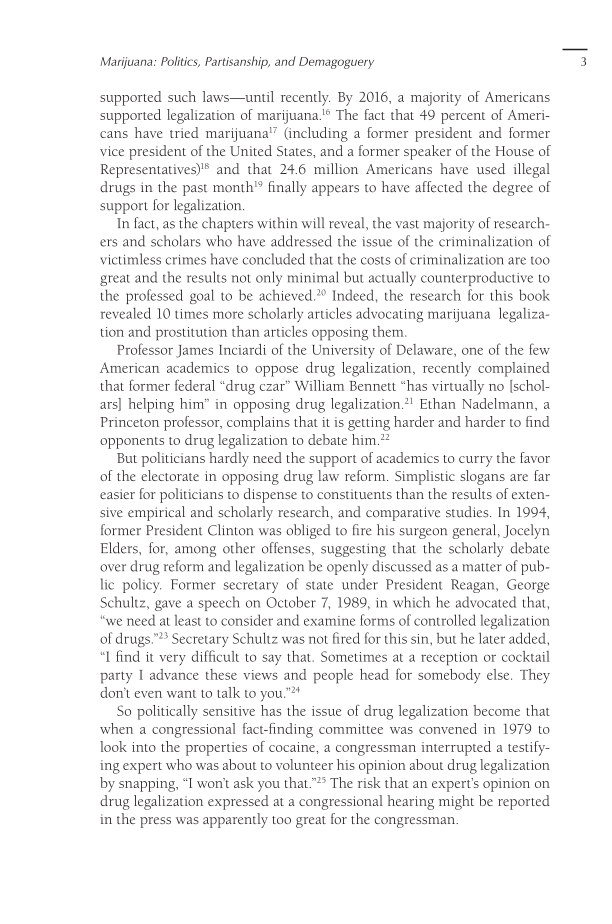Marijuana: Politics, Partisanship, and Demagoguery 3
supported such laws—until recently. By 2016, a majority of Americans
supported legalization of marijuana.16 The fact that 49 percent of Ameri-
cans have tried marijuana17 (including a former president and former
vice president of the United States, and a former speaker of the House of
Representatives)18 and that 24.6 million Americans have used illegal
drugs in the past month19 finally appears to have affected the degree of
support for legalization.
In fact, as the chapters within will reveal, the vast majority of research-
ers and scholars who have addressed the issue of the criminalization of
victimless crimes have concluded that the costs of criminalization are too
great and the results not only minimal but actually counterproductive to
the professed goal to be achieved.20 Indeed, the research for this book
revealed 10 times more scholarly articles advocating marijuana legaliza-
tion and prostitution than articles opposing them.
Professor James Inciardi of the University of Delaware, one of the few
American academics to oppose drug legalization, recently complained
that former federal “drug czar” William Bennett “has virtually no [schol-
ars] helping him” in opposing drug legalization.21 Ethan Nadelmann, a
Princeton professor, complains that it is getting harder and harder to find
opponents to drug legalization to debate him.22
But politicians hardly need the support of academics to curry the favor
of the electorate in opposing drug law reform. Simplistic slogans are far
easier for politicians to dispense to constituents than the results of exten-
sive empirical and scholarly research, and comparative studies. In 1994,
former President Clinton was obliged to fire his surgeon general, Jocelyn
Elders, for, among other offenses, suggesting that the scholarly debate
over drug reform and legalization be openly discussed as a matter of pub-
lic policy. Former secretary of state under President Reagan, George
Schultz, gave a speech on October 7, 1989, in which he advocated that,
“we need at least to consider and examine forms of controlled legalization
of drugs.”23 Secretary Schultz was not fired for this sin, but he later added,
“I find it very difficult to say that. Sometimes at a reception or cocktail
party I advance these views and people head for somebody else. They
don’t even want to talk to you.”24
So politically sensitive has the issue of drug legalization become that
when a congressional fact-finding committee was convened in 1979 to
look into the properties of cocaine, a congressman interrupted a testify-
ing expert who was about to volunteer his opinion about drug legalization
by snapping, “I won’t ask you that.”25 The risk that an expert’s opinion on
drug legalization expressed at a congressional hearing might be reported
in the press was apparently too great for the congressman.























































































































































































































































































































